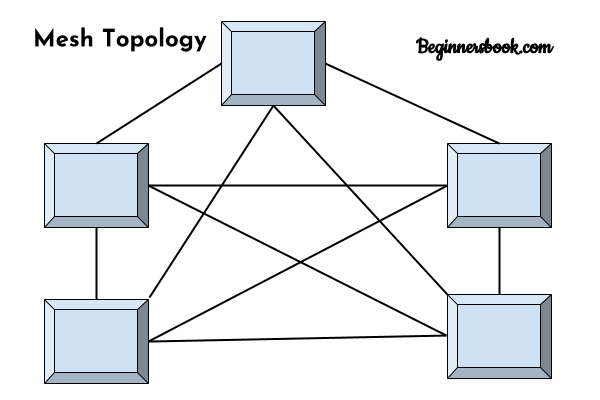Geometric representation of how the computers are connected to each other is known as topology. There are five types of topology – Mesh, Star, Bus, Ring and Hybrid.
Types of Topology
There are five types of topology in computer networks:
1. Mesh Topology
2. Star Topology
3. Bus Topology
4. Ring Topology
5. Hybrid Topology
Mesh Topology

In mesh topology each device is connected to every other device on the network through a dedicated point-to-point link. When we say dedicated it means that the link only carries data for the two connected devices only. Lets say we have n devices in the network then each device must be connected with (n-1) devices of the network. Number of links in a mesh topology of n devices would be n(n-1)/2.
Advantages of Mesh topology
1. No data traffic issues as there is a dedicated link between two devices which means the link is only available for those two devices.
2. Mesh topology is reliable and robust as failure of one link doesn’t affect other links and the communication between other devices on the network.
3. Mesh topology is secure because there is a point to point link thus unauthorized access is not possible.
4. Fault detection is easy.
2. Mesh topology is reliable and robust as failure of one link doesn’t affect other links and the communication between other devices on the network.
3. Mesh topology is secure because there is a point to point link thus unauthorized access is not possible.
4. Fault detection is easy.
Disadvantages of Mesh topology
1. Amount of wires required to connected each system is tedious and headache.
2. Since each device needs to be connected with other devices, number of I/O ports required must be huge.
3. Scalability issues because a device cannot be connected with large number of devices with a dedicated point to point link.
2. Since each device needs to be connected with other devices, number of I/O ports required must be huge.
3. Scalability issues because a device cannot be connected with large number of devices with a dedicated point to point link.
No comments:
Post a Comment